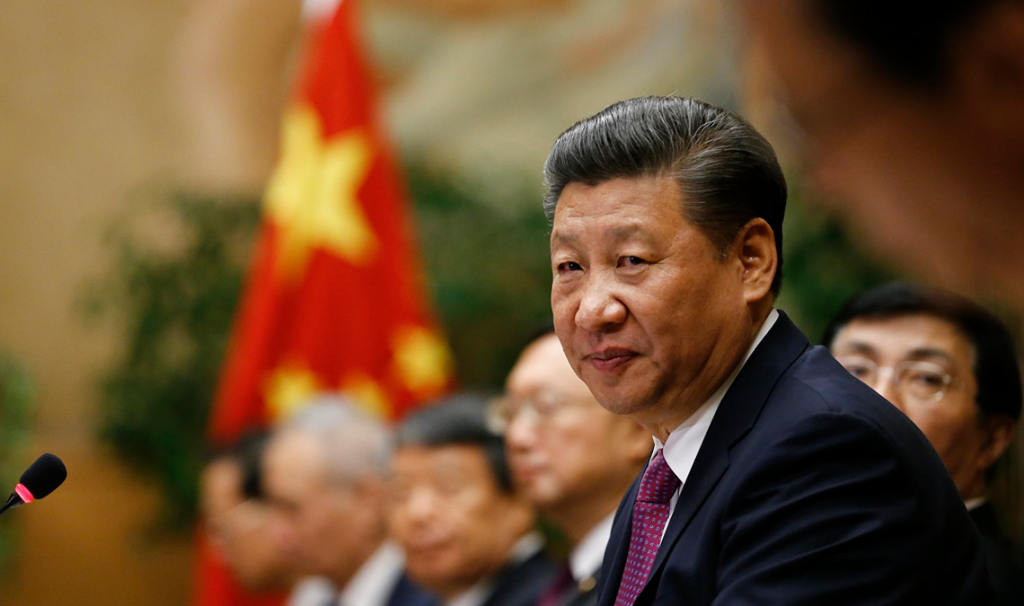
Xi Jinping in Geneva, Jan. 2017 (Reuters photo)
Kenneth Fan provides insight on Chinese leader Xi Jinping’s ambition for a China-centered world order
(Written by: Kenneth C. Fan, originally published here, reprinted with permission.)
Frankly, I’m tired of hearing experts debate whether or how soon China might attack Taiwan, or the issue of whether Taiwan is worth defending.
I’m bored of these discussions, not because they aren’t significant. Rather, it’s because the mindset behind many who discuss these topics severely underestimates the political and economic predicaments China currently faces. Many commentators also short-change the ambitions of Chairman Xi Jinping (習近平) and are unaware of the unique cultural, structural aspects of the CCP regime which influence thier course of action when threatened, such as China is today.
Just as plain as Bill Clinton’s 1992 presidential campaign slogan, “It’s the economy, stupid,” I must emphasize to all experts discussing the China-Taiwan conflict, “It’s not about Taiwan, stupid. It is about Tianxia (天下).”
In a historical sense, “Tianxia” is a Chinese term that every Chinese person understood throughout different dynasties, even down to the peasants who didn’t have the privilege of primary schooling. The term means “the entire world that one can conceive,” or literally “All under Heaven” (tian (天) means sky or heaven, and xia (下) means under).
Allow me to tell a true story that might shock some readers. Anyway, it shocked me, a native Mandarin speaker and a 20-plus-year China affairs veteran. Back in the summer of 2013, after some 20 years mingling with people of all sectors of society and levels of political power in China, I decided to come home to retire in Taiwan. A middle-aged advisor for the then newly elevated CCP Chairman Xi, came to Taipei and met with me through the introduction of a contact whom I knew well in China.
The purpose of the visit: Xi privately revealed his intention of keeping his throne for at least 20 years. Since Xi didn’t trust the old guards around him, he secretly gathered a group of about 100 young advisors to “construct a grand theory” to buttress his endeavor. The group did come up with a grand theory with only one missing link – how does one to place Taiwan’s experience, especially its one-person-one-vote system, into the grand theory? This particular gentleman decided to visit Taiwan to find an answer to that missing-link question, and asked our mutual acquaintance to identify someone who deeply understands both China and Taiwan. And I fit the bill.
As a courtesy, I drove him to a scenic location nearby Taipei, the capital city of Taiwan. We talked on the way. All of a sudden, the man shouted, “Stop the car! We can’t have a decent discussion while driving!” So, I parked the car at a safe corner on the highway, expecting to rest for a few minutes. Then he started talking and asking questions. The roadside discussion lasted 6 hours.
He talked about his observations in Japan, Korea, Singapore, and several Southeast Asian countries. He wanted to know what made Taiwan so different. Approaching the end of the discussion, I praised him for his international exposure, and he responded by saying “For someone who has never left China, I’m hardly international.” Shocked, I questioned him whether he was lying to me about all those observations about Japan, Korea, Singapore, and other Asian countries. He snapped, and with a scornful look, made a statement that I will never forgot, “I didn’t leave China, those places are all domestic!”
Later, he asked me to keep the content of the conversation private. I agreed, and considered that such a conception might be just his personal idiosyncratic worldview and not a disclosure of Xi’s own worldview. It was not until 2015, after observing Xi very closely, that I became convinced that it was indeed a conception also shared by Xi. The world needs to know about this outlook of Xi’s, I thought. So, I pondered Xi’s options given such a worldview, and published a book titled “Chatting with Xi Jinping About Taiwan and China.”
To this day, as far as I am aware, the book is likely the first document that disclosed Xi’s intentions for his anticipated 20-year reign. Notably, his actions while in power and the evolution of his leadership matched almost exactly what was projected in the book. My encounter with the mysterious Xi advisor was also disclosed in later articles I published.
So, it must be emphasized that in Xi’s mindset, it was never about Taiwan, it is always about Tianxia. More pointedly, Xi conceives the scope of Tianxia in the same manner as ancient emperors, while perceiving himself as heir apparent to China’s dynastic legacy. Please note, in this regard, Xi is even less “international” than Mao. The scope of Mao’s mindset was bounded to the “Communist International.” Mao was ambitious in the manner of Stalin or Lenin, while Xi’s imaginative capacity is way beyond that.
Remember how Xi turned reefs into military bases in the South China Sea? Remember One-Belt, One-Road? I truly do not know who is more naive, the Americans or the Europeans. But I am pretty sure if one were to show this piece of writing to a Vietnamese reader, they would understand it better. As Western and Japanese corporations are “friend-shoring” their factories to Vietnam, they assume they have found a safer location for business that within China proper. Well, they may be wrong, because Vietnam is definitely part of Tianxia in Xi’s mind.
No matter how imaginative a Western scholar or politician may be, the modern West’s historical concept of international order is bound to the system of Westphalian sovereignty. The Westphalian Order is only 400 years old, while the concept of Tianxa as an imperial precept is at least 2,000 years old, and it precludes the notion of mutual sovereignty among states.
Now back to the starting point of this article. Taiwan may serve as the excuse to kickoff a military campaign to realize Xi’s Tianxia vision, and it would also serve as China’s scapegoat. But circumstances are changing; at this very moment, an international alliance is forming which is keenly concerned with the security of Taiwan. However, the flashpoint of military conflict with China could also shift to some other regional locations, say, the Philippines, Okinawa, or even a U.S. territory, such as Guam.
I humbly urge all China or CCP watchers to turn their attention to the historical conception of Tianxia. Coupling Tianxia and the philosophical concept of “Yin-Yang,” or dialectical maneuvering, any traditional game-theory-based analysis for political conflict or military simulation may fall short.
For example, Xi may be smart enough not to risk a direct nuclear confrontation with the U.S. and instead decide to find a middle ground to pursue his Tianxia vision. This might be accomplished by detonating a tactical nuclear warhead in the desert area of Australia. This would not be an unimaginable tactic for Xi, in my view. It would certainly disrupt the “pivot to Taiwan” thinking of military analysts and cause great confusion in the Western alliance.
Adding fuel to the fire, what if Putin exploded a tactical nuclear warhead in the wilderness of Ukraine around the same time?
It is a great mistake to equate Putin’s nationalism with Xi’s Tianxia ambition. Putin’s nationalism is at best a dream of empire, while the scope of Tianxia is beyond building an empire. The implications of Xi’s Tianxia vision are incredibly far-reaching and could have devastating consequences for the world. It is essential that the international community is aware of the potential threat posed by this ambition and takes steps to ensure that it is not realized.
The Westphalian sovereignty order is crucial to ensuring that the world remains safe and secure. As a contrast, in Xi’s own words, “All mankind needs a new order that surpasses and supplants the balance of power…A new world order is now under construction that will surpass and supplant the Westphalian System.” This is a direct quote from the official texts on “Xi Jinping Thought” (2018) and was found and quoted in congressional testimony by Mr. Matt Pottinger, Chairman of the Foundation for Defense of Democracies, China Program and a former deputy national security adviser in the Trump White House. Xi hasn’t been hiding his worldview; the naivete of the world has simply caused nations to ignore the danger.
It’s never only about Taiwan. It’s about Tianxia, and that includes you, the reader. It is essential that we all understand the implications of this vision and take steps to ensure that it is not realized. We must remain vigilant and take action to protect our world from the potential threat posed by Xi’s Tianxia impulse. So, let’s not to be stupid. We must protect Taiwan’s democratic sovereignty.
Please keep this in mind: The existence and survival of Taiwan’s democratic sovereignty is essential for curtailing Xi Jinping’s Tianxia dream. If unchecked, such a vision would be a nightmare for mankind.
Kenneth C. Fan holds a Master Degree in Philosophy from Columbia University, NYC. He ran a consulting firm in China for over 20 years, and now runs Insightfan.com, an Indo-pacific Watch Group in Taipei, Taiwan. He is a columnist for major Taiwanese publications and an author of 10 books, the latest one titled “Post-CCP China.” He can be reached at Taibeijing@gmail.com








